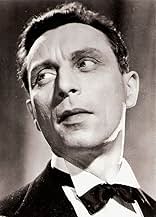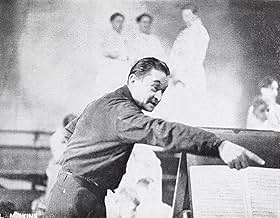Christine, newly widowed and consumed by the memory of a ball she attended age 16, decides to track down the men she danced with that night and discover their fates.Christine, newly widowed and consumed by the memory of a ball she attended age 16, decides to track down the men she danced with that night and discover their fates.Christine, newly widowed and consumed by the memory of a ball she attended age 16, decides to track down the men she danced with that night and discover their fates.
- Awards
- 5 wins total
- Eric Irvin
- (as Pierre-Richard Willm)
- Bremont
- (as Maurice Benard)
- Teddy Mélanco
- (as Alcover)
- Fred
- (as Adam)
- Melanco - Un complice de Jo
- (as Legris)
- Le Guide
- (as Nassiet)
- L'adjoint du maire
- (as Genin)
- La marchande de journaux
- (as J. Fusier-Gir)
Featured reviews
The film is a series of set pieces as Marie sets about her mission and each name on the card is given a short section. This made the film tolerable to watch as beforehand I was thinking to myself "Oh my goodness, this film is almost 2 and a half hours long!" Well, it doesn't seem like it and that is a credit to the director and the actors and actresses involved. In fact, the film is constantly entertaining even if it does focus on some downbeat situations. You can definitely relate to these people. My favourite story is the one that concerns the priest as it shows how life can move on from sadness in a positive way. I do have 1 question, though - what is that ending about!!? Is that a blossoming romance!!?
In real life, sentimental reflections just make me sad so I don't see the point but this film is worth a watch even if the topic is somewhat asking for trouble. I googled a friend when I was reminiscing of past times and found out that he had become a Hollywood stuntman and had jumped from a plane but his parachute failed to open. Miraculously, he survived as some tree branches broke his fall. He broke every bone in his body and his memory has been affected. I wish I hadn't looked him up! This film is a bit like that but more fun.
I saw it first around 1941 when I was 14, during the war, at the long lamented Academy cinema on London's Oxford Street. It turned up there periodically, along with La Femme Du Boulanger, Le Jour SE Leve, The Strange Case of David Gray (a renamed Vampyr), La Fin Du Jour, and some other prewar classics. Great stuff for a schoolboy! Previously I've had it on a censored Korean DVD (the Marseilles sequence had been removed) but now,happily,it's available complete as a gloriously restored Bluray. Gaumont,you have our huge thanks!
It's a magnificent film, a bit wordy perhaps here and there but they're good French words. It's a lasting achievement by a superb cast and crew at the top of their game.
And with great respect let's give thought to Harry Baur and Robert Lynen (Duvivier's Poil de Carotte), both murdered by the Nazis during the occupation.
A recent widow (Marie Bell) is going through her possessions when she discovers the dance card from a ball she attended when she was 16, twenty years before. She thinks back fondly on the romantic setting of the dance, idealized in her mind, as well as the men who had hearts in their eyes for her. "Men have loved me," she says to her friend. "At least, so they said. He loved me, loved me not, loved me. They declared their love in between waltzes. I can still hear them. 'As long as I live.'" It's funny how these kinds of moments stay with us forever in life, and that the heart never forgets.
After obtaining the addresses for eight of the ten men (the other two have deceased), she resolves to visit them, so what follows in the film is a series of vignettes. There are lots of memorable moments, so I thought I would capture some of them in quotes:
#1, the mother who has gone mad over her son's suicide, an eerie episode: "Children change so suddenly. You tuck them in one night. 'Good night, my child.' The next morning you feel like saying, 'Good morning, sir.'"
#2, the lawyer turned gangster (Louis Jouvet) who runs a girlie show that doubles as a prostitution ring: "We'd stroll through the country." "We'd stop by the bridge." "It's all water under that bridge now." "We'd wait for the dusk." "It never failed us." "We didn't speak." "Our minds were on other things. I'd kiss your neck, trembling." "I'd close my eyes and pretend I didn't see you." "We were foolish. It was charming." "We'd make plans." "More like dreams."
#3, the priest who had harbored love for her, but on the night of his piano concert (when he was nearly 40 and she was 16) he realized, crushingly, that it was unrequited: "In music one bares one's soul. Anyway, there was an andante - I turned around. She was sitting beside a nice, young man, and they were both laughing, about nothing in particular, like kids with their balloons. My music coursed through the hall like a river, but the two of them formed an island, untouched by the music. For her, I didn't exist."
Also: "Tell her I've always kept a place for her in my heart, a place that I can say without shame belongs to a young girl who could be far away, perhaps even dead."
#4, the man who has retired from the world to the snowy mountains, who seems at peace with life and offers to start up a new relationship with her, but she knows he has obligations to others in the community, and after he goes out following an avalanche, she leaves him, writing: "I'm not angry with you. You're incapable of being unfaithful. It's better this way. Be happy."
#5, the mayor who is marrying his maid the day she arrives, and whose son from his first marriage is a major disappointment. He had very high ambitions when young, and he says of not quite reaching his goals: "I set out on a long journey. Then the sun came out and I stopped midway."
#6, the doctor who performs cheap, illegal abortions and has degraded himself over the years and is in a miserable state, something emphasized by the severe Dutch angles Duvivier gives us and the noisy construction work during this vignette: "I'm ashamed hearing you speak about my youth. All those years of anxiety, hopes, dreams...I wish I could sum them up in one word, but I can't find it."
#7, the hairdresser (Fernandel) who named his daughter after her, but pretends he can't remember her name when he sees her. He was my favorite character, with adorable kids, fun 1930's equipment in his salon, and a thing for performing card tricks: "I was smart to stop loving you. ... You'd have loved me back, and we'd have gotten married, and what would have become of my poor wife?"
She actually gets a chance to go to a ball in the same location that he assures her hasn't changed over the years, which shows her that her memory has been idealized, a fantastic moment. In a young woman she meets there who is in a bit of a reverie over the experience, we also see the cycle repeating. The hairdresser then tells her this: "Music certainly brings back memories. Every word I said that night is coming back to me. Like when I said, 'I'll love you as long as I live.' ... You say dumb things on the dance floor."
At this point, she returns to her friend, saying, "Not a one lived up to his youth. I set out full of illusions, and came back full of regret. ... The past didn't live up to the promises of the future, and I lost my dance partners in the act of finding them." His wise reply is "There's no need for regrets. If not for this trip, you'd have led a farandole of specters the rest of your life. Now the chain is broken, and life starts anew."
I thought that's where the film should have ended, but the address for #8, Gerard, is located and so one more meeting is tacked on. Well, she actually discovers that Gerard has passed away too, which made 4 of the 10 dead, and another probably about to die, a pretty high percentage if you ask me. Anyway, she meets his son instead, and rather than end on a downer with one more "destined to never meet again," Duvivier leads us to what felt like an artificial, feel-good conclusion, which was I thought was a little unfortunate. All in all, however, a very enjoyable, touching film.
Did you know
- TriviaMichael Caine has mentioned "Un carnet de bal' among his favorite movies.
- Quotes
Christine Surgère: He died as this desk writing that letter, in mid-sentence. You may read it.
Bremont: "I have neither the desire nor the inclination to travel. Why bother? Christine is always with me. I'm happy. I even think my life --"
Christine Surgère: Yes, it breaks off there.
Bremont: Who was he writing to?
Christine Surgère: I'll never know.
Bremont: "I even think my life --"
Christine Surgère: Strange isn't it?
Bremont: Dying right on that word.
- ConnectionsFeatured in Fejezetek a film történetéböl: A francia lírai realizmus (1989)
Details
- Release date
- Country of origin
- Official site
- Language
- Also known as
- Life Dances On
- Production companies
- See more company credits at IMDbPro
Box office
- Budget
- $100,000 (estimated)
- Runtime2 hours 24 minutes
- Color
- Sound mix
- Aspect ratio
- 1.37 : 1
Contribute to this page




































